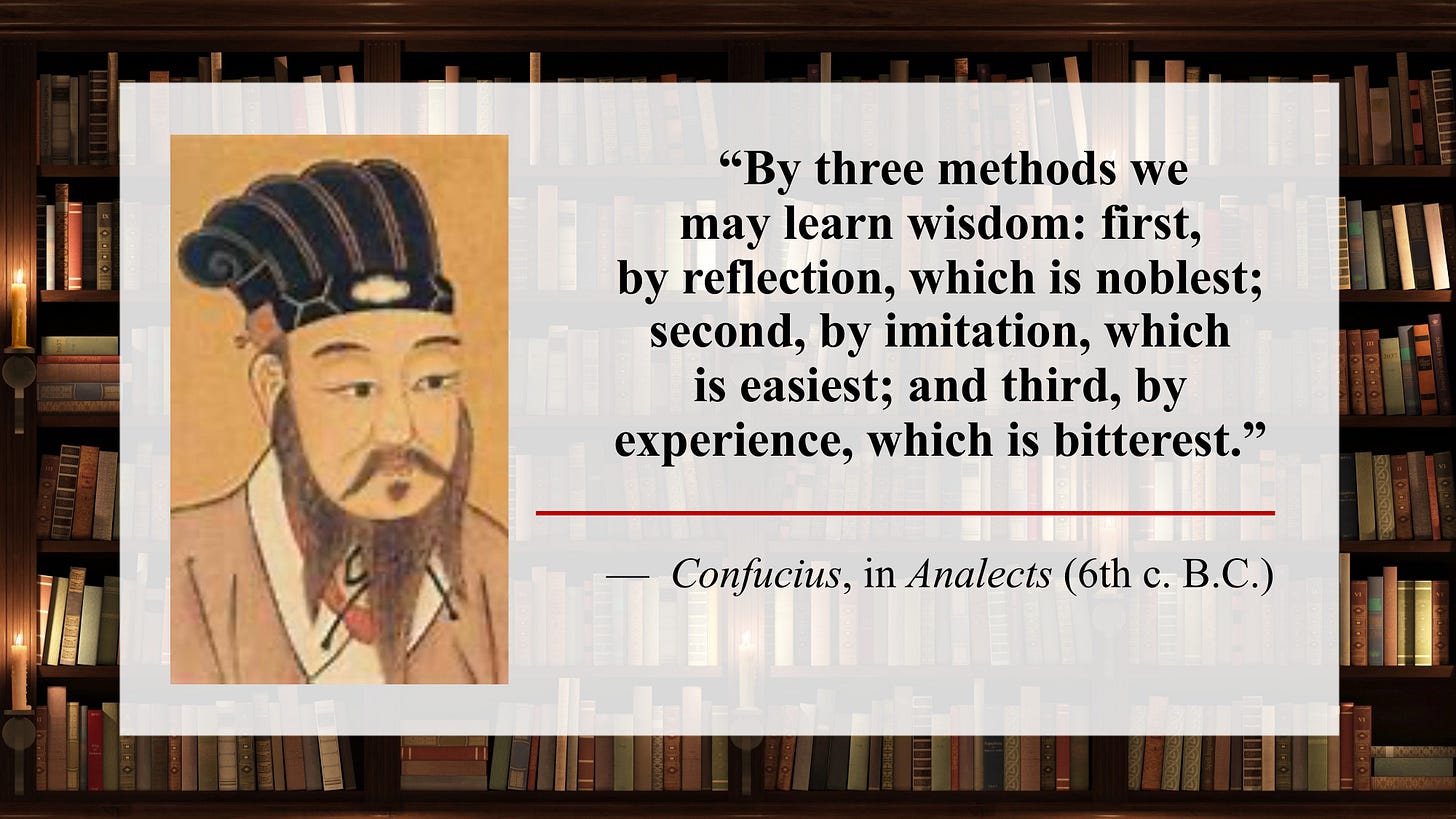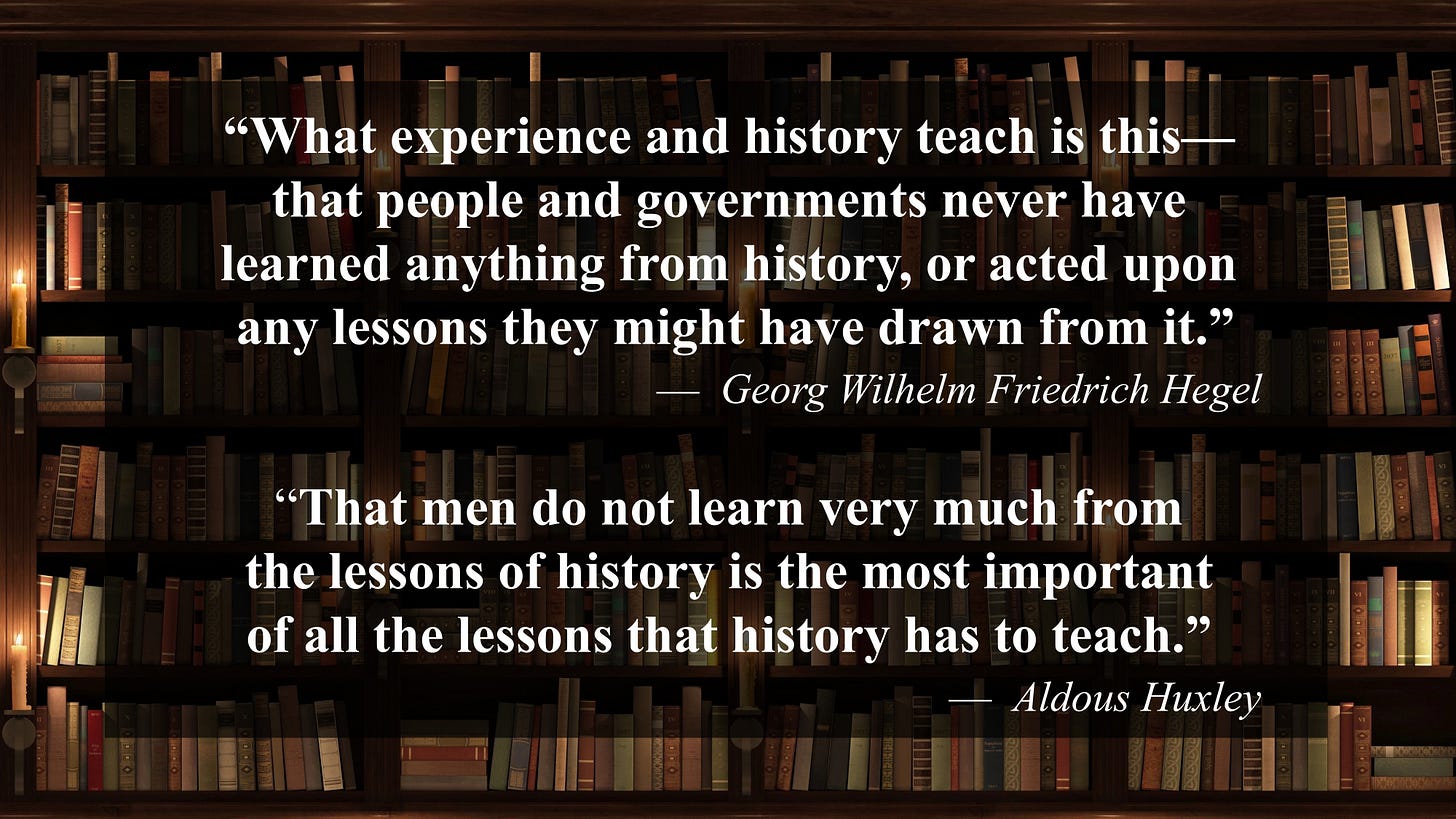Dr. Mardy's Quotes of the Week ("Learning From Experience")
February 16-22, 2025 | THIS WEEK'S THEME: “Learning From Experience"
The Oys of Aging
I’m scheduled for an aortic valve replacement in a little less than two weeks. I’ve been monitoring my aortic stenosis for several years, and it significantly worsened in the past few months. I was convinced to do the procedure after my heart doctor said, “If we don’t do something now, the likelihood of your dying in the next two years is over fifty percent.” Since then, I’ve learned a lot more about what to expect and it’s nothing short of amazing. A visual depiction of this important advance in medical technology may be seen here (scroll down to “What is Aortic Stenosis?”).
Without minimizing the seriousness of the situation, I view this as just one more bump in the long road of life. The next two weeks will be filled with medical preparatory activities—including a cardiac catheterization and CT-scan—but I believe I’ll still be able to send out my newsletter as usual.
Great Opening Line of the Week
In 1995, Mitch Albom was a sports reporter at the Detroit Free Press when he learned that one of his favorite Brandeis University professors, Morrie Schwartz, was dying of Lou Gehrig’s disease. The two men had been close in the 1970s, and Albom felt guilty about letting sixteen years pass with no contact. After reaching out to his former professor, he flew every week from Detroit to Boston to visit the 78-year-old Schwartz at his home.
Albom hoped the proceeds from an anticipated book might help pay Schwartz’s medical bills. He didn’t expect much, but after Tuesdays with Morrie was published in 1997, it spent four years on The New York Times Best Seller list, selling nearly twenty million copies (in 1999, it was adapted into a popular made-for-tv film, with Jack Lemmon as Schwartz and Hank Azaria as Albom).
For more than 2,000 memorable opening lines from every genre of world literature, go to www.GreatOpeningLines.com.
This Week’s Puzzler
On February 22, 1819, this man was born in Cambridge, Massachusetts. Raised in a prominent Boston Brahmin family, he was a bright lad who showed exceptional promise. However, after beginning his studies at Harvard at age 15, he set upon a systematic four-year program of disappointing his parents. An inattentive student who was prone to discipline problems, he wrote in his journal during his senior year:
He began to get things together in his final year and was even elected class poet. Following a longstanding Harvard tradition, he was scheduled to recite a poem at Commencement, but he was suspended for disciplinary reasons several days before the event. His classmates eventually pooled their money and, in a show of support for their wayward friend, printed the poem privately.
In large part to satisfy family expectations, he attended Harvard Law School and even practiced law for a few years. He grew deeply unhappy with his career choice, though, and later confessed that he’d put a pistol to his head on several occasions. To combat his depression, he returned to his old love of poetry, began writing critical essays, and in 1843 co-founded a short-lived literary journal, The Pioneer. Even though the publication failed after three issues, it holds the distinction of publishing Edgar Allan Poe’s “The Tell-Tale Heart” in its inaugural issue.
With his renewed passion for poetry and literature, this week’s Mystery Man found a reason for living and went on to become one of the most prominent intellectuals of his era (he was even invited back to teach at his alma mater in 1854). Today, he is best remembered as one of the legendary Fireside Poets, an esteemed group of 19th-century New England poets that included Henry Wadsworth Longfellow, John Greenleaf Whittier, and William Cullen Bryant.
Respected in the intellectual community for his erudition and creativity, his writings were filled with memorable metaphorical observations. In Among My Books (1870), for example, he wrote:
Who is this person? (Answer below)
Have You Been Good at Learning From Experience?
The quotation in this week’s Puzzler is part of a large family of observations that are captured by one of history’s most popular proverbs: “Experience is the best teacher.” The meaning of the proverb may be expressed simply: the lessons we learn through the experience of living are more profound and impactful than those we learn from all other methods of instruction.
More than 2,500 years ago, the Chinese sage Confucius identified experience as one of the three principal methods of attaining wisdom, and he did it in an intriguing way:
The notion that learning from experience is “bitter” is particularly interesting because Confucius was clearly thinking about bad experiences when he offered the thought. The idea that bad experiences can lead to good results was also reflected in this week’s Puzzler quotation, which made reference to the thorn of experience. For me, the entire matter can be summarized this way: even though we often pay a big emotional price for our mistakes and blunders, experience is a particularly good teacher when we fail. In his 1859 classic Self-Help, Samuel Smiles expressed it well:
“We learn wisdom from failure much more than from success; we often discover what will do, by finding out what will not do; and probably he who never made a mistake never made a discovery.”
Over the years, so many people have echoed Smile’s sentiment that it is now almost universally accepted that our most impressive gains come in the aftermath of the most painful moments of our lives. Of many great observations on the topic, one of the best comes from Friedrich Nietzsche:
Given all of this, I believe a good case can be made that the saying “Experience is the best teacher,” is indeed true. I would, however, add this one important caveat: “But only if the student is ready to listen and learn.”
If your experience is anything like mine, you know many people who showed great early promise, but who ended up making a complete mess of their lives. Did they learn from experience? Clearly not. In fact, for many of them, a modern proverb accurately describes what happened with many of them:
“Insanity is doing the same thing over and over and expecting a different result."
The conclusion is inescapable: While all people can learn from experience, the history of homo sapiens (literally, “wise men”), proves that many do not. In a 1990 book, Douglas Adams expressed it well:
You will notice that Adams is referring to the experience of others rather than to people’s firsthand experience, and that puts his observation in close proximity to two of the most famous observations about people failing to remember the lessons of history:
Everything said above about the failure to learn from history applies to people who fail to learn from personal experience. And it certainly applies to me.
For the most part, I believe it is accurate to say that I’ve been pretty darn good at learning from experience in my life. But, in all honesty, there are a few areas in which I’ve not only been bad, but exceptionally bad, at doing so. In a few of those darker areas of my being—where the fatal flaws reside—I’ve failed again and again and again, especially in my earlier life. Happily, or perhaps I should say, luckily, my inability to learn from those early experiences didn’t prove fatal. However, in each and every example, if things had turned out just a little bit differently, they could have easily destroyed my reputation, my career, or, in one case, my life.
For reasons I think you will understand, I won’t be detailing those failures here. But please know that this whole subject of learning from experience is not some academic or ivory tower topic. It goes to the very heart of how effectively—or not—we’ve lived our lives. So this week, take a few moments to reflect on how good you’ve been at learning from experience—especially your failure experiences. Before you do, though, take a few moments to peruse this week’s selection of quotations on this important theme in human life:
All experience is an arch, to build upon. — Henry Brooks Adams
Good judgment comes from experience and experience comes from bad judgment. — Rita Mae Brown
The light which experience gives us is a lantern on the stern, which shines only on the waves behind us. — Samuel Taylor Coleridge
Experience may be hard but we claim its gifts because they are real, even though our feet bleed on its stones. — Mary Parker Follett
Experience is not what happens to a man; it is what a man does with what happens to him. — Aldous Huxley
Experience is a good teacher, though her fees are terribly high. — W. R. Inge
Experience is a hard teacher because she gives the test first, the lesson afterward. — Vernon Law
I like to think of my behavior in the sixties as a learning experience. Then again, I like to think of anything stupid I've done as a learning experience. It makes me feel less stupid. — P. J. O’Rourke
The lessons of experience are always learned too late. — George Sand
One never believes other people’s experience, and one is only very gradually convinced by one’s own. — Vita Sackville West
For source information on these quotations, and more observations on the theme of LEARNING FROM EXPERIENCE, go here.
Cartoons of the Week:
Answer to This Week’s Puzzler:
James Russell Lowell (1819–1891)
Dr. Mardy’s Observation of the Week:
Thanks for joining me this week. See you next Sunday, when the theme will be “Appreciation.”
Mardy Grothe
Websites: www.drmardy.com and www.GreatOpeningLines.com
Regarding My Lifelong Love of Quotations: A Personal Note













Mardy, I hope you realize you have an army of followers whose hearts are with your heart as you face your aortic valve replacement. We appreciate you sharing this latest “bump in the long road of life” because you are as close as any dear friend. Concerning learning from experience, as a lifelong teacher I’ve summarized it this way: “We learn what we do.” We can read a book about swimming or giving a speech, but we never master the skill until we “do” it.
.... And, Mardy, my thoughts and I'm sure those of your many fans, will be with you over the next few weeks. May everything go as planned, and may Murphy take a holiday!